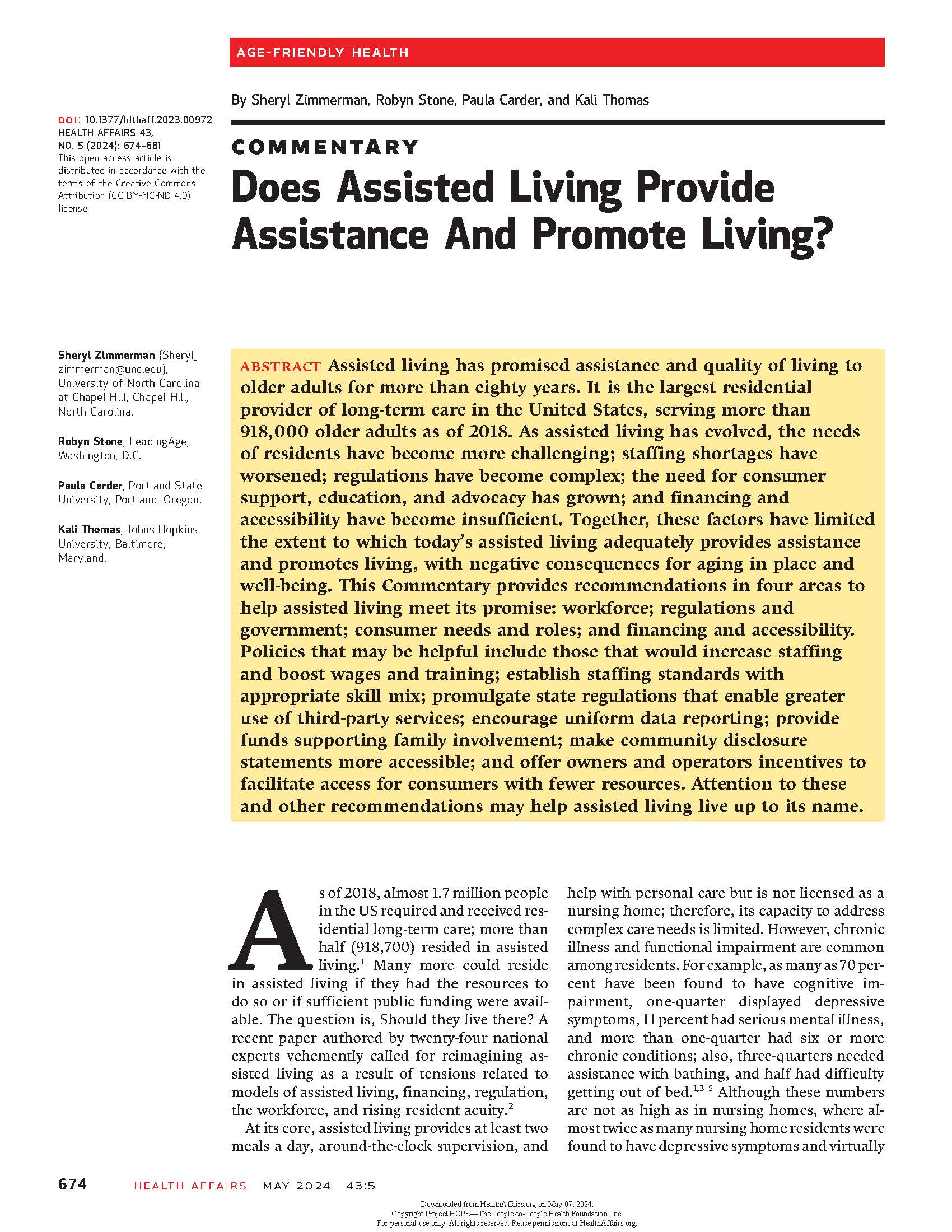Early in our longitudinal qualitative study on meaningful engagement and quality of life among assisted living (AL) residents with dementia, researchers observed differences between the activities scheduled on monthly engagement calendars and those taking place. Yet, we were unable to identify any research examining such deviations or their implications. Thus, drawing on data from three […]
Journal of Applied Gerontology
A Cross-Sectional Study of Nurse Turnover in Residential Care Communities
A Cross-Sectional Study of Nurse Turnover in Residential Care Communities
We examine what facility characteristics are associated with nurse turnover in residential care communities (RCCs). This is a cross-sectional study using the 2018 National Study of Long-term Care Provider Public Use File. There were 3331 RCCs (unweighted n = 272) represented when examining registered nurse (RN) turnover and when examining aide turnover there was a […]
Impact of Antecedent and Organizational Differences on Nurse-Social Worker Collaboration in a Retirement and Assisted Living Community with Skilled Nursing Care
Impact of Antecedent and Organizational Differences on Nurse-Social Worker Collaboration in a Retirement and Assisted Living Community with Skilled Nursing Care
Nurse–social worker collaborative interactions in long-term care settings have received limited attention. This qualitative thematic study of 23 participants (11 social workers and 12 nurses) at an urban retirement and assisted living community explores experiences of collaborative work. Two themes of contrasts in responding to resident complexity and contrasts in peer-to-peer work highlight four subthemes […]
Bioethics in Gerontology: Developing a Typology of Ethical Issues in Assisted Living
Bioethics in Gerontology: Developing a Typology of Ethical Issues in Assisted Living
WHAT THIS MEANS FOR YOU: A team of researchers developed a typology of the ethical conflicts that are likely to exist within AL communities. Drawing on data from a 5-year qualitative study in four ALs for validation, this typology aims to help families, staff, and residents identify and understand ethical best practices in AL communities.
Objectively Measured Physical Activity and Sedentary Behaviors Among Older Adults in Assisted Living Facilities: A Scoping Review
Objectively Measured Physical Activity and Sedentary Behaviors Among Older Adults in Assisted Living Facilities: A Scoping Review
WHAT THIS MEANS FOR YOU: This scoping review included 20 articles from 15 studies that used devices to track physical activity behavior in AL residents. On average, residents spent between 96 and 201 minutes each day doing light physical activity, but only 1 to 9.74 minutes on moderate to vigorous activity. In addition, residents were sedentary for 8.5 to 11 hours while awake. Personal, social, and environmental factors influenced completion of physical activity in the included studies; however, none of the included interventions successfully increased activity or reduced sedentary behavior.
Home Time and State Regulations Among Medicare Beneficiaries in Assisted Living Communities
Home Time and State Regulations Among Medicare Beneficiaries in Assisted Living Communities
WHAT THIS MEANS FOR YOU: A study of “home time” (days alive and not in healthcare institutions such as hospitals or skilled nursing facilities) of over 59,000 Medicare beneficiaries who transitioned into assisted living in 2018 found that residents spent 94% of their first year at home in the community. Characteristics associated with lower home time included dual Medicare-Medicaid eligibility, having more chronic conditions, and specific conditions (e.g., dementia). Additionally, in states with more specific regulations for direct care worker staffing and training, and lower specificity for staff licensing requirements, residents tended to spend more time at home. Thus, both individual characteristics and state regulations may impact home time for new assisted living residents.
Paperwork, Paradox, and PRN: Psychotropic Medication Deficiencies in Assisted Living
Paperwork, Paradox, and PRN: Psychotropic Medication Deficiencies in Assisted Living
WHAT THIS MEANS FOR YOU: This study analyzed 170 psychotropic medication deficiency citations from 152 Oregon assisted living communities to determine discrepancies in state licensing and oversight of psychotropic medication use. It found most deficiencies involved documentation errors; there were unclear regulations for direct care workers who distribute medications; and there was a persistent disconnect about when to seek expertise before requesting psychotropic use.
Depression within the First Year of Relocation to Residential Care/Assisted Living: Where You Come From Matters
Depression within the First Year of Relocation to Residential Care/Assisted Living: Where You Come From Matters
WHAT THIS MEANS FOR YOU: Data from a national survey of 2,651 assisted living residents found that approximately 35% moved to assisted living from an acute/post-acute facility; they were more likely to have depression compared to those moving from community-based residences.
Ethics of Health Information Sharing and Social Relationships at End of Life in Assisted Living
Ethics of Health Information Sharing and Social Relationships at End of Life in Assisted Living
WHAT THIS MEANS FOR YOU: This qualitative study of observation and 61 interviews with assisted living residents, family members, staff, and external care workers in one large community in Atlanta, found that while sharing health information could strengthen social bonds among residents, there were concerns about privacy; for example, when inappropriate public exchanges occurred, they hindered social relationship building. Barriers to communicating health information contributed to resident isolation, but negotiating privacy boundaries to share such information may promote resident wellbeing.
The Ethics in Long-Term Care Model: Everyday Ethics and the Unseen Moral Landscape of Assisted Living
The Ethics in Long-Term Care Model: Everyday Ethics and the Unseen Moral Landscape of Assisted Living
WHAT THIS MEANS FOR YOU: Drawing from existing research, theories, and case examples, this article highlighted moral complexities experienced in assisted living (e.g., privacy, sexual intimacy, safety and risk) and proposed a framework to identify and address these issues and promote more ethically sound practices. The proposed model centers on moral decision-making and interpersonal encounters and is intended to guide future research, policy, and practice.
Potential Side Effects and Adverse Events of Antipsychotic Use for Residents With Dementia in Assisted Living: Implications for Prescribers, Staff, and Families
Potential Side Effects and Adverse Events of Antipsychotic Use for Residents With Dementia in Assisted Living: Implications for Prescribers, Staff, and Families
WHAT THIS MEANS FOR YOU: This study examined the use of antipsychotic medications among residents with dementia in 91 AL communities across seven states. The prevalence of potential side effects was high (93%) and of possible adverse events low, (6%), potentially associated with medication side effects. Quetiapine (Seroquel) and risperidone (Risperdal) were the most frequently prescribed antipsychotics. Most, but not all, residents’ family members were aware of their relative’s antipsychotic use.
Assisted Living Administrators’ Approaches to Advance Care Planning
Assisted Living Administrators’ Approaches to Advance Care Planning
WHAT THIS MEANS FOR YOU: Interviews with 27 AL administrators revealed different approaches to advanced care planning (ACP). They all acknowledged the importance of ACP and often discussed topics like “do-not-resuscitate” orders when new residents arrived. Challenges included insufficient ACP training for staff and administrators and some reluctance from residents and families to discuss ACP. Most communities lacked a systematic, structured ACP approach.
Model Testing of the Factors that Influence Performance of Function Focused Care and Function among Assisted Living Residents
Model Testing of the Factors that Influence Performance of Function Focused Care and Function among Assisted Living Residents
WHAT THIS MEANS FOR YOU: A study of 550 AL residents from 59 communities found that factors such as better physical and cognitive health, positive care interactions, and supportive environments were associated with increased participation in function-focused care. Additionally, for-profit communities had higher levels of function-focused care despite having residents with lower functioning.


